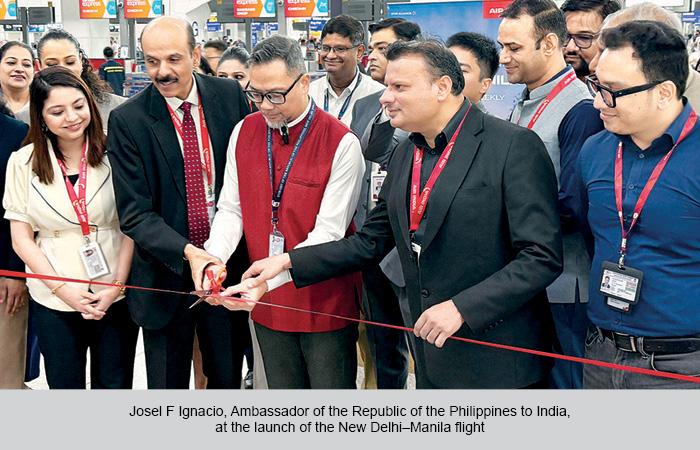The 10th Travel MICE & Corporate Show underscored a pivotal shift in corporate travel dynamics. With companies increasingly prioritising sustainability as a core business strategy, collaborative efforts across industries are crucial. The event highlighted a growing consensus on integrating sustainable practices into corporate travel.
Janice Alyosius
The 10th Travel MICE & Corporate Show, organised at the Hyderabad Marriott Convention Centre in Hyderabad from 6-7 July, witnessed around 2,300 B2B meetings involving 33 exhibitors and 72 buyers. One of the highlights of the event was the panel discussion on the future of sustainable practices shaping the travel industry, particularly from the corporate point of view.
Sharing his views on the current situation, Amarnath Lal Das, Vice President, India Travel, Meeting & Events, Accenture Solutions, said, “Post-pandemic, if you observe how do we operate now compared to previously, there has been a significant dynamic shift. This shift is underscored by persistent cost pressures amid rising fares and hotel tariffs. Companies are compelled to manage within unchanged budgets, necessitating strategic cuts without compromising on essential business functions. Cuts inevitably have to be made somewhere.”
Emphasising on the growing importance of sustainability, Dr Sanjay Pai, Vice President, Facilities, Corporate Travel, Hospitality & Director Aviation/ Accountable Manager, Larsen & Toubro, said, “Sustainability is everyone’s business. Currently, all travel managers are recording their verticals of expenses towards carbon footprint to a central model for reporting. Though it’s not mandatory yet, in the next two to three years, it will become obligatory.” He added, “Travel is just a small fraction of it, but it contributes significantly from airlines, hotels, facility waste, and more. Sustainability needs to mature comprehensively, not just from top to bottom but also vice versa.” While the shift towards sustainable practices in corporate travel is gradual, initiatives like tracking carbon footprints are gaining traction. Neha Bose, Hotel Manager, The Westin Hyderabad Hitec City, said, “Our hotel is LEED Gold certified. So, there are many proactive measures we are taking for our guests. Initially, it was just about reuse and recycle, but we have now moved beyond that and are starting to understand what they are asking for. These efforts, while currently optional, are anticipated to become obligatory in the near future, aligning with global goals of achieving net-zero emissions.”
Rajiv Vij, Chairman and Managing Director, Carzonrent India, highlighted the role of technology in driving efficiency and sustainability in ground transportation. “Automation is the only way forward,” Vij asserted.
Carzonrent’s investment in technology has streamlined operations, reduced paper usage, and introduced electric vehicles (EVs) into their fleet, marking a significant step towards reducing carbon emissions.
“We have implemented a programme where we track the number of kilometres that corporate clients cover in EVs. We calculate the carbon savings from these journeys and include this information in every invoice, showing how much CO2 emissions they have saved. Additionally, we provide them with a monthly certificate that they can use internally, indicating the amount of CO2 emissions saved from using non-electric vehicles that month. This aspect will be a significant part of the industry going forward.”
Gaurav Shekhar Nagwekar, Head, Travel Logistics & Corporate Service Administration, Reliance Industries, acknowledged the evolving priorities in corporate travel. “In the past, even corporates were specific in terms of cost. Cost was the basic criterion when they used to look at any travel programme. Today, things have changed. Safety and security have taken the forefront, followed by sustainability. So, leadership is talking about it. They are trying to drive it. It’s a long way, but I’m sure we shall get there in a few years.”
Dev Karvat, Founder & CEO, Asego, illustrated how innovation can foster sustainability in the insurance sector. “I believe that creating awareness is the first step towards sustainability. In the past, our travel insurance policies used to be lengthy documents of terms and conditions. However, with our new self-booking online tools, we issue close to 1.5 million completely paperless policies annually. We actively discourage customers from printing policies due to environmental concerns,” he said. “Regarding claims, we have partnered with multiple insurers. For smaller, non-medical claims, such as lost baggage, passport issues, or delayed baggage delivery, we aim to settle these without requiring original documents. We have developed an app where customers can upload their documents, allowing us to credit claims directly to their accounts. These small initiatives are crucial in promoting sustainability,” he added.
By embracing sustainability, leveraging technology, and prioritising employee welfare, businesses can navigate the complexities of the post-pandemic era while contributing to a more sustainable future.
 TravTalk India Online Magazine
TravTalk India Online Magazine





